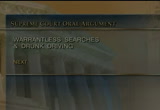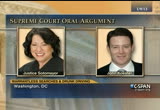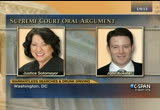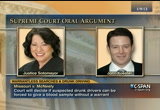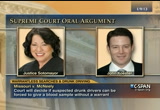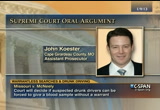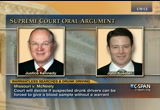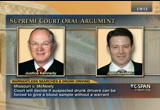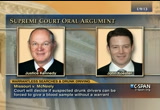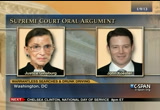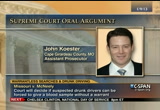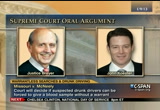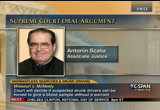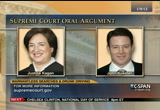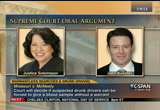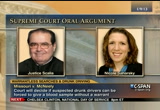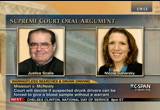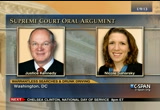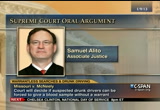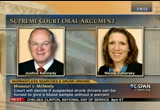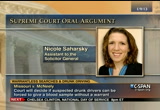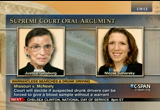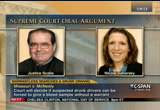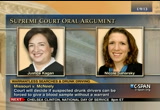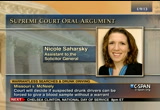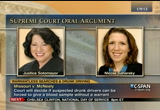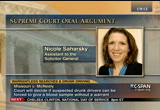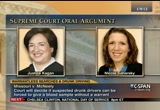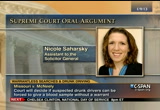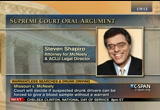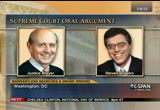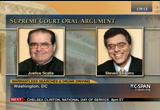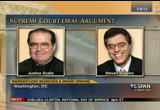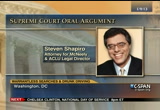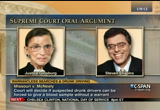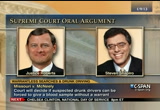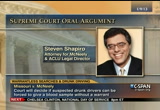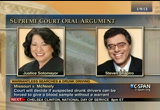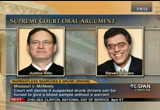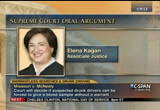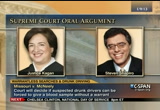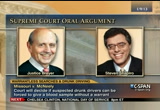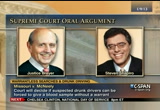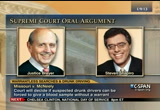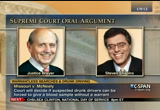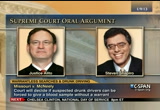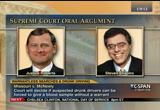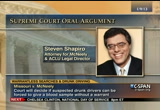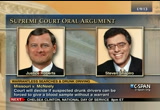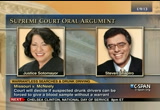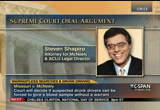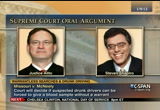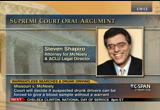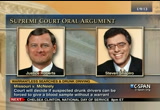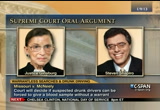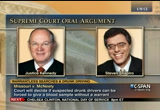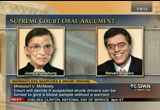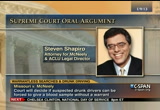tv Supreme Court DWI Blood Samples CSPAN January 19, 2013 7:00pm-8:00pm EST
7:00 pm
>> we will hear arguments first this morning and case number 111425, missouri versus mcnealy. mr. kessler? >> thank you. course of a drunk driving investigation, quickly securing blood alcohol evidence with as little delay as possible is incredibly important justice sotomayor: how come it took so long for this state to figure out that it needed to do this without a warrant? justice sotomayor: the officer testified that he's been making drunk driving arrests for years -- mr. koester: yes, your honor. justice sotomayor: and i think in only one circumstance did he need to do it without a warrant. so what made the need here eminently the sense of impractical to get the warrant? mr. koester: well, your honor, back in 2003, there was a -- an
7:01 pm
appellate court case from missouri that dealt with the importance of the words -- justice sotomayor: no, i understand why he decided to do it, to forego getting a warrant. isn't his testimony dispositive of this case? he had time to get it. mr. koester: your honor, that ignores the fact that had he sought a warrant -- there's no question that he would have been able to secure a warrant. the issue was, it was going to take a considerable amount of time. justice sotomayor: but it took a considerable amount of time for all the years he did it. mr. koester: that's true, your honor. justice sotomayor: and he didn't testify to it causing a loss of any particular case. mr. koester: but in this particular case, it was going to take 90 minutes to two hours to secure the warrant. and during that period of time, the most probative evidence was going to be dissipating, was going to be lost. justice ginsburg: but he said -- he said in the 10 or so cases he
7:02 pm
had had in the past, i encountered no difficulty getting a warrant in prior cases. there was nothing that distinguished this case on the facts from other cases on the facts. mr. koester: that's correct, justice ginsburg, he never had a problem securing a warrant, but there was a delay, and that's the difference. we're looking at a delay, and quickly securing blood alcohol evidence is important because the -- the evidence is being lost at a significant rate with every minute that passes. justice sotomayor: what constitutional right exists for a state to get the best evidence? mr. koester: well, justice something that we should always strive for, to be able to get the best possible evidence in the case. justice sotomayor: no, no, no. you, the state, want to strive for that. but what in the fourth amendment contemplates that that's a right the state must have, that is has to get the
7:03 pm
very best evidence it can? mr. koester: the touchstone of any fourth amendment analysis is the reasonableness of the search. and it's reasonable justice sotomayor: so how can it be reasonable to forego the fourth amendment in a procedure as intrusive as a needle going into someone's body? say this because breathalyzers in my mind have a much different intrusion level. they don't intrude into your body. and i think almost all jurisdictions use breathalyzers instead of blood tests. a small fraction that actually use blood tests. the ruling by us today is going to change that and is going to -- if in your favor, is going to change that and put sort of a print, the court's print -- >> use the most intrusive way
7:04 pm
you can to prove your case. mr. koester: and, justice sotomayor, i would disagree with that. if the court rules in our favor, i think the end result will be more people will agree to take the breathalyzer test. in this case, the arresting officer gave the defendant an option to take the breathalyzer test and when he clearly told him he was not going to take it, that's when he decided to take him to the hospital in order to draw the blood. justice scalia: why don't you force him to take the breathalyzer test, instead of forcing him to have a needle shoved in his arm? mr. koester: for practical -- justice scalia: what is the difference between the reliability or the acceptability by juries of a breathalyzer test, as opposed to a blood draw? mr. koester: justice scalia, both tests are very reliable. we rely on the breathalyzer test on a daily basis, but for practical reasons it's very difficult to force a drunk driver to take a breath test. the breathalyzer instruments, they measures deep lung alveolar air.
7:05 pm
and you have to take a very deep breath. and one police officer told me it's sort of like you can put a balloon in front of somebody's mouth, but you can't make him blow it up. it's very difficult for practical reasons to force someone to blow into the breathalyzer. justice kennedy: if we are talking about reasonableness, do you think it's relevant for us to look to the rules and practices of other states? mr. koester: justice kennedy, as the respondent points out, there are 25 states that would be opposed to -- to the warrantless blood draw at issue in this case. and as i point out in the reply brief, 15 of those states have joined amicus delaware urging this court to reverse the decision of the missouri supreme court, but i think -- justice kennedy: but the fact that those states do have a warrant requirement and from what we can best tell make it work very well, including some
7:06 pm
expedited procedures where you can get warrants within minutes -- it takes usually the policemen, say, 20 minutes to get just to the hospital or the police station anyway. mr. koester: and, justice, if we see that other states, a significant amount of other states, number one, require the warrant, number two, many of those have expedited procedures, does that bear on our determination of reasonableness? mr. koester: i don't believe it does, justice kennedy. i think, as -- as virginia v. moore plainly teaches, individual state laws do not affect whether or not this activity was reasonable under the constitution. justice kennedy: but we have always -- correct me if i'm wrong. i think that we have always thought of fourth amendment reasonableness standards as being a national standard. suppose 40 states -- you know, we can play the game. suppose 40 states had rules that you have warrants and many of them had expedited procedures. that's still irrelevant? we don't look at that at all? mr. koester: your honor, i think this court's decision in
7:07 pm
sampson v. california is instructive. in that particular case, the court approved suspicion-less searches of parolees, and i think a vast majority of states disapproved of that particular law enforcement practice. but that does not bear on the issue of whether or not that violates the fourth amendment. justice scalia: of course we don't know why they disapproved. and i guess your point is they may well not have permitted it because they were under what you would call the mistaken belief that it was unconstitutional. mr. koester: i suppose that is a possibility, justice scalia. justice kennedy: is there any showing that conviction rate in those states is lower than in the states where the practice is to take the test without the warrant? mr. koester: your honor, i think amici national district attorneys association cited a study. i know the respondent also cited a study that shows it doesn't have any bearing. but i think it's pretty clear that if you have concrete evidence of a drunk driver's
7:08 pm
blood alcohol content, concrete evidence, that gives you a far greater case, a far greater chance of securing a conviction at trial. justice sotomayor: so the new rule is we have to strengthen -- the fourth amendment is going to be suspended whenever the prosecution can't get the best evidence to make its case out? mr. koester: no, justice sotomayor. i think as long as a police officer has probable cause, what we're saying is it's objectively -- justice ginsburg: probable cause is not enough. if you have probable cause, then you can get a warrant. but it was and i think still is the main rule that if you can get a warrant, you must do that. probable cause is surely not enough. then we'd never need a warrant when there's probable cause. mr. koester: you are absolutely right, justice ginsburg, probable cause is not enough. but probable cause coupled with the indisputable fact that
7:09 pm
alcohol is eliminated from the human body with every minute that passes after a drunk driver is pulled over justice kagan: mr. koester, suppose that, instead of waiting two hours, there were procedures in place in missouri and, indeed, across the country where it was possible to get a warrant in these circumstances within 15 or 20 minutes. would you still be saying that there is a sufficient exigency to avoid the warrant requirement? mr. koester: i think if a particular jurisdiction had perfected the warrant process to the point where they could in 15 minutes, i think we would have a different outcome. i think that would affect the analysis of the case. but with all due respect to the hypothetical, i think it is a time-consuming process to obtain search warrants. justice breyer: so why can't you do that? i mean, the only virtue i see in saying you have to go get a warrant is the officer picks up the phone, there is usually somebody on duty, a magistrate
7:10 pm
somewhere, he phones him up and says, i have a drunk driver here, he's wobbling, he can't cross the center line, and he won't take a breathalyzer, i want to give him a test. now, you have a second judgment and the officer has to talk to somebody, so he's a little more careful. and that's a protection, not necessarily for this person, but a protection for others who maybe weren't wobbling. all right. so i think that's the question you're being asked. why -- what's the problem with doing that? which adds a little bit of security that this warrant really is -- this search is really necessary. mr. koester: justice breyer, i think in practical application it is going to be more of a time-consuming process, though, to obtain the search -- justice breyer: why wouldn't it take -let's see, how long did it take me to say that? it took me about 30 seconds. so even if you are a lot more careful, why would it take more than, say, 3 minutes? mr. koester: to obtain a search warrant --
7:11 pm
justice breyer: well, what you do is you have a system, and you phone up and you do just what i said. and this man or woman who is there is not a policeman. the virtue of it is this man or woman is trained to listen to policemen and others say things and try to pin him down a little bit and make an independent judgment. so why would it take more than 5 minutes? mr. koester: well, justice breyer, that's why i drew the analogy between the telephonic search warrants that were approved back in the 1970s. it sounds like that would be an instantaneous procedure, but some of the lower courts that have actually examined the process, they came to the conclusion that it's still a time-consuming process -- justice scalia: mr. koester, in most jurisdictions, unless i'm mistaken, the cop on the beat cannot apply for and get a search warrant. he has to go through a prosecuting attorney or someone in the prosecutor's office first. so it's not just getting hold of a judge. it's getting hold of the
7:12 pm
prosecutor first and then getting hold of the judge if the prosecutor approves it, right? mr. koester: that is absolutely correct. justice scalia: is that the case in missouri? mr. koester: that is the case in missouri. chief justice roberts: in some cases i suppose the judges actually want to read the affidavit and give it some thought. it's not going to be 3 minutes. mr. koester: that's exactly right, mr. chief justice. i think if we were to the point where we were approving search warrants in 3 minutes, it would essentially be a rubber stamp justice ginsburg: but we do have, i think, an indication that there are jurisdictions that do it inside of a half- hour. mr. koester: that may be true, justice ginsburg. justice sotomayor: so do you define reasonableness -- justice kagan: you suggest that 15 or 20 would be a different case. i am wondering where you would draw the bright line. mr. koester: that's a difficult question, to draw a bright line for exactly when we would draw the line where -- where the exigency would disappear. justice sotomayor: so would the importance of the search warrant suggest, as a constitutional right, suggest that we should judge reasonableness by the people who
7:13 pm
are the least efficient or by the people who are the most reasonably efficient? mr. koester: well, justice -- justice sotomayor: meaning people, police jurisdictions. mr. koester: in -- of course, local law enforcement practices are going to vary from jurisdiction to jurisdiction. justice sotomayor: absolutely, but should they -- should we permit them to vary in terms of inefficiency or should we be encouraging them to vary within a reasonable range? mr. koester: well, i think prosecutors are always going to strive to -- obtain search warrants as efficiently as possible. but whether or not this was a reasonable search does not depend upon local police practices. if there are no further questions, i would like to reserve the balance of my time. chief justice roberts: members of the court have intruded on your rebuttal time, including me, so we will give you a little extra. mr. koester: thank you. ms. saharsky.
7:14 pm
ms. saharsky: mr. chief justice, and may it please the court: here the police are facing a destruction of critical blood alcohol evidence. every minute counts, and it's reasonable for the officers to proceed without a warrant. i would like to pick up where some of the court's questions led off: this idea that we might live in a world where warrants could be gotten so quickly that -- there is not true exigency. first of all, that is not state of the world now. there is substantial variation from jurisdiction to jurisdiction, and we are just not in a place where the time to get the warrant everywhere is 15 minutes or less. justice scalia: but -- i mean, once we say that you don't need a warrant -- you know, even if things improve, the game's up, right? no? ms. saharsky: no, i don't think that that's true at all. the police do not have justice scalia: you mean somebody can come up 10 years from now and say, although you approved it 10 years ago without a warrant, things have changed, so now you need a warrant? ms. saharsky: i think that if the world changed so that every police officer had an ipad and
7:15 pm
that judges were always on duty and that the warrants could be gotten that quickly, you would consider that and you would also consider the other sources of delay, which are the time to get to the hospital, etc., etc. but yes, i would -- justice scalia: but if that's the case, then why shouldn't that determination be made case by case? ms. saharsky: because -- justice scalia: case by case, whether in fact it would have taken that long to get a warrant? and if it would have taken too long, then it's okay without a warrant. if it wouldn't have taken that long, it's bad. ms. saharsky: the question justice scalia: totality of the circumstances test, right? ms. saharsky: right, but the totality of the circumstances are with respect to the destruction of evidence and what the police are witnessing. they know there is certain destruction of evidence and what they are weighing that against is uncertainty about whether there's time to get a warrant. they have no idea what this person's blood alcohol content is. they have no idea how fast it's decreasing. they might -- justice ginsburg: ms. saharsky, what about saying at least they should try, since a number of jurisdictions can do this within a half hour, say, initiate the process while you are going to the hospital, when
7:16 pm
a half-hour is up you proceed, but at least there has been an effort to get a warrant. ms. saharsky: i think there -- i think there are legal problems with that and practical problems with that. the legal problems is that the court has never suggested that the police are both simultaneously in require-a- warrant land and not in require- a-warrant land. justice kennedy: well, we have -- i don't want to because you have multiple answers -- but on that point, we do talk about exigent circumstances. if we proceed as justice ginsburg's suggestion indicates, then the fact that you can't get a warrant within 45 minutes is the exigent circumstance. ms. saharsky: right. i mean, in all of the destruction of evidence cases the court has said, there's destruction of evidence, we're not going to make you wait until half of it is destroyed or three-fourths of it is destroyed or something like. and that's the rule really that respondents want. justice kennedy: but justice ginsburg said 30 minutes. ms. saharsky: right. and what i'm saying is as a practical matter, i think it would be very difficult to -- to suspect that nationwide folks could get warrants in those circumstances. you typically have one police
7:17 pm
officer on the scene who is making the traffic stop, asking the person questions, taking him through the field sobriety test. that would have to be the officer who would do the affidavit in support of the search warrant because he's the one who's witnessing. justice alito: jurisdictions have an incentive to get a warrant, i would think. even if they -- even if we were to say that they don't need one, they certainly have a strong incentive to get warrants because it insulates the search to a much greater degree from later challenge -- at a suppression hearing. so why shouldn't it depend on the practicalities in a particular jurisdiction? not every jurisdiction has prosecutors and judges who are staying up at -- you know, 3:00 o'clock in the morning on sunday morning waiting for the phone to ring or for -- to receive some sort of an electronic message that there has been a stop and somebody wants a -- wants a search warrant. you know, big jurisdictions can do that, but small ones can't. so why -- but if you are in a big jurisdiction that -- or one that feels that they can afford that, then why should -- you know, why should the fourth
7:18 pm
amendment permit the search to take place without the warrant when it could have been obtained. ms. saharsky: well, i mean, a couple of responses. first of all, this court makes nationwide rules and the question is whether it's reasonable to do what missouri did here even if other jurisdictions would choose to or could do it differently. but second -- you know, this idea with respect to -- that it should matter based on the time to get a warrant is something the court has never done in its fourth amendment exigency cases. and it may be the case that a court looking backwards could say, well, we think you had enough time to get a warrant. but the police officer where he stands with the person, he knows a few things. he knows one thing for sure: that evidence is going to be lost, and it's critical evidence. it's not just to get above .08, but you have these laws that are enhanced with -- justice kennedy: i thought that we often said that you look at whether or not you can get a warrant before you can break in so that the drugs aren't flushed down the toilet and so forth. we make that judgment all the time. ms. saharsky: right. justice kennedy: and if that showing is not made, you must get a warrant. ms. saharsky: but the court -- justice kennedy: so i think it's quite incorrect to say that we don't look at the time factor. ms. saharsky: i think it matters
7:19 pm
as a general -- justice kennedy: we look at it all the time. ms. saharsky: i think it matters as a general matter whether warrants take time to get and whether evidence is lost. but the court has never gone jurisdiction to jurisdiction. it has never second-guessed the police in the way that the court is suggesting today. in kentucky v. king, for example, an exigency case, the court said the police could have proceeded a couple of different ways here, we are not going to make them use the least restrictive way, we are just going to ask whether what they did was reasonable. justice kennedy: i agree that there is a uniform standard. but -- and i don't know if you ever did finish the answer to justice ginsburg, but she -she had suggested that we have a uniform rule of exigent circumstances. that -- her suggestion complies with your objection. ms. saharsky: well, if i am understanding it correctly, i think our point is this, which is that the police officers have to act reasonably in the situation. and in a situation they know for sure the evidence is going to be lost, they know that every minute is critical. for example -- justice sotomayor: but there are so many situations in which we require a warrant, nevertheless. when there is drug dealing in a house, every time people enter
7:20 pm
that house, it's almost a certainty that they're going to use the drugs and that evidence is going to disappear. you rely on hope -- on knowing that there's likely to be telltale signs left over. and that's the same thing you do in an alcohol situation. you rely on the testimony of the police officer, you rely on the implied consent presumption. iss not as if this destruction of all evidence, and -- and not like a fleeing situation where someone gets away, you have nothing left. this is vastly different. ms. saharsky: i mean, with respect, we disagree. this evidence is critical, and the number matters. i mean, it is the case that blood alcohol evidence is the most important evidence. this court has recognized this in several cases -- schmerber. skinner -- and since then the law has only changed to make it more important.
7:21 pm
justice ginsburg: you mentioned schmerber. why did the court go through all of the -- why -- it could have made it a much shorter opinion by simply saying, yes, blood alcohol dissipates. but it didn't. it pointed out that in that particular case there was a delay to investigate the accident, the person had to be taken to the hospital for care, so how much time elapsed? i think it was two hours, wasn't it? ms. saharsky: the court -- made a mention of two hours, but that was not a critical portion of its analysis. we don't think that that mattered to schmerber because the court said, first, there was clear probable cause in that situation. justice ginsburg: what was all the -- why was it in the opinion? ms. saharsky: well, it's one line in the opinion. if you look at it, the court says, we are told the percentage of alcohol in the blood begins to diminish shortly after drinking stops, the body functions to eliminate it from the system. particularly in a case like this, time had to be taken to bring the accused to a hospital and to investigate the scene
7:22 pm
justice ginsburg: yes. they didn't need to say any of that. ms. saharsky: well, they said particularly it means there's an extra thing. but it doesn't mean that the first thing wasn't enough. and what we say is if there was some uncertainty in schmerber, the court's case justice scalia: that doesn't mean that it was enough, either, right? ms. saharsky: well, that gives me the second part of my answer, which is the court's cases since schmerber have relied on the destruction of this evidence being enough for exigency. and i would just point the court to look at skinner, at south dakota v. neville, at winston v. lee, and even in a footnote in kentucky v. king. this court has not said anything about the person having to go to the hospital and whether there was an investigation justice scalia: counsel for missouri tells us, ms. saharsky, that the breathalyzer is just as good and that in fact he expects that the consequences of our ruling in his favor in this case will be that drunken drivers will agree to the breathalyzer test. but i don't know why it isn't adequate to produce that result simply to put the drunken driver in a -- in a paddy wagon and on the way to the hospital. say -- you know, we're going to be in the hospital in 20 minutes, we're applying for a
7:23 pm
warrant, when we get there, we're going to -- we're going to -- you know, stick a needle in your arm, unless, of course, you agree to take the breathalyzer test. why isn't that enough to -- to force them into the breathalyzer test, so that they will blow up the balloon. ms. saharsky: well, because in that situation, i think they're willing to take their chances that the evidence is going to dissipate below the .08 standard or below these higher enhanced penalties, .15, and then be able to challenge it, as opposed to if they gave the evidence that they potentially wouldn't be able to challenge it. but i think the point that comes justice kagan: or maybe they're drunk. [laughter] justice kagan: but, but, but -- i mean, justice scalia raises a point, which is you always have some delay. unless you are talking about sticking a needle in somebody roadside, you have to take them to the hospital. so there's going to be some amount of time which you're going to lose, and why can't you use that amount of time, if you can, to try to get a warrant? ms. saharsky: well, i think there are two answers.
7:24 pm
one, you typically as a practical matter have one officer on the scene who's proceeding with this and he's the one that would have to prepare the affidavit, typically the one to consult with the prosecutor. he's the one who's going to drive to the hospital. presumably, we don't want him texting during driving, etc. the second answer is a legal answer, which is that the court has been very hesitant to second-guess the police in these circumstances and to say when the police are in a fluid situation they have to, say, try to get a second officer on the scene and maybe do the justice kennedy: now, i think you should be fair. he doesn't have to prepare a written affidavit in a number of these states. it's a telephonic warrant. you have to give us that. ms. saharsky: well, even in some of the telephonic warrant procedures, you still have to have a written document. you just write it out and then you read it to the judge and then actually a record needs to be made of it. the case united states v. reid in the fourth circuit actually considered this and said -- you know, it sounds like it won't take that long, but it turns out these procedures actually take a while. and it's not just the time to get a warrant. it's the initial time that had been taken at the stop, the investigation, the field sobriety test. then, there's the time to get to the hospital. and -- you know, sometimes these people, these folks, get to the hospital and they're not given first priority, so there's sometimes some waiting at the hospital.
7:25 pm
justice sotomayor: so is it okay -- is it okay to let police officers take the blood? ms. saharsky: well, we think that's a different question and one that the court reserved in schmerber. the court said there was medical personnel in a medical setting taking the blood in that case. that's the exact same thing that's happening here. but it said if we had a different case, we'd ask whether the -- the situation invited an unjustified element of personal risk of infection and pain. so we think the court should get a case that has a record on this and then it could make a determination as to whether there is that risk. justice sotomayor: oh, i bet that if we rule in your favor, we will. ms. saharsky: i'm not sure that that's true. the reason that a few states have considered having police officers get trained in this way is basically out of necessity. it is just in rural jurisdictions it's too far to get to the nearest hospital. but it's fair to say that police officers do not want to be in this business of taking blood. it diverts them from their other activities. you know, it's an extensive training process. so i -- i'm not sure that that's true, but it's not something the court has to decide justice sotomayor: do you want to be in those rural places and be stopped without an independent magistrate approving a field officer taking
7:26 pm
blood from you? ms. saharsky: well, what i'm saying is that there are only a few states that are doing it now, and i think it is -- it should be -- the court should wait until it actually has a record to make that determination. but -- you know, there has been training along those lines. that's something, for example, that nhtsa at the department of transportation has helped these states investigate whether it's a real option because the police officers are very far away from -- you know, the nearest hospital and that it's -- it's all based on this concern about destruction of evidence. but just to get back to -- justice kagan: going back to justice scalia's question, if a person does take a breathalyzer, is there ever a reason for a warrantless blood test? ms. saharsky: yes. as a general matter, you would not need to obtain a blood test -- you know, practically because the evidence is not the same, but -you know, substantially as good. the blood test is a little better in that you have a sample that sticks around as opposed to one that is gone. you also get two samples, so the defense can test it, and it is better evidence with respect to whether it's susceptible to challenge. you also might have someone who consents to a breath test, but because, as you pointed out, they're so drunk they can't give a good sample, like they say they'll provide a sample,
7:27 pm
but they really just can't. and then there's another case that is not the fact here, but something we would want the court to be careful about, which is driving under the influence of drugs. those do not show up on a breath test, but the police officers might have very good reason to believe that the person is under the influence, such that they might take a breath test and get a zero reading, but still want to take a warrantless blood test. so all the court needs to do to resolve this case is say where this person refused a breathalyzer -actually, the exact same facts of schmerber -- it was -it was reasonable for the police to say, we know this evidence is going away, we know it's going to be lost, maybe we can get a warrant quickly, maybe we can't, we don't know what his blood alcohol is, we don't know when it's going to dip below .15, .08, let's just go ahead and proceed. justice kagan: all this talk about -- you know, losing evidence every second, i mean, i suppose the exact same thing could be said in other alcohol- related crimes, public drunkenness, underage drinking. you wouldn't be making the same arguments there, would you? or would you? ms. saharsky: no. i mean, the -- the question you'd ask will be the same, which would be a reasonableness
7:28 pm
balancing test, but i think the government interest on the side of that balance would be very different from the ones at issue here. you know, the court here has said that drunk driving is a serious public safety problem. we're talking about one person being killed every 51 minutes, despite everything we've done in the last 3 decades. justice kagan: so it's not just exigency that you're -- you're saying that there should be a weighing of the costs and benefits here. ms. saharsky: yes. that's what the court did in schmerber. it looked at the intrusiveness of the blood test in this context and then it looked at the government's need for the evidence. and the need for the evidence in the cases you're positing we suspect the court would not think as strong as the evidence here. but just to get back to some of the questions the court has had about the time to get warrants, i mean, the evidence that the court has before it is that it would take at least an hour and a half to two hours to get a warrant here. that's in the joint appendix, page 54. even though the person said -- one officer said he could get in touch with the prosecutor and judge, he did not quantify how long it would take. there's also an exhibit that the -- justice kennedy: incidentally, it wasn't clear to me: is that 1 hour from the time of the --
7:29 pm
pardon me -- two hours from the time of the stop or two hours from the time he put him in the back of the patrol car? do we know? ms. saharsky: it's not entirely clear, but i think it's two hours total. there was also on page 70 of the joint appendix an exhibit that the defense put in that make it look like one and a half hours to two hours total. i also -- chief justice roberts: you can finish your thought. ms. saharsky: there's one other piece of data, which is a nhtsa study that's referred to in the briefs, about where the court -- where folks in four states where warrants were required tried to get them quickly as possible. they put the judges on staff, they tried to do it electronically as much as possible, and still there it was one and half to two hours. that's on page 37 of that study. thank you. chief justice roberts: thank you, counsel. mr. shapiro. mr. shapiro: mr. chief justice, and may it please the court: the issue in this case is whether the state may stick a needle in the arm of everyone arrested on suspicion of drunk driving without a warrant and without consent. missouri's answer to that question is yes, even in routine dwi cases like this and regardless of how quickly and easily a warrant could be obtained. justice breyer: i thought the question was if -- if in fact the person won't agree to a breathalyzer. mr. shapiro: the question is -- it's not clear to me.
7:30 pm
number one, your honor, there's nothing in the record to suggest that the driver is always first offered the opportunity, the choice of choosing a breathalyzer as opposed to justice breyer: was your client was offered the breathalyzer twice? mr. shapiro: this client was offered the breathalyzer, your honor. justice breyer: how many times? mr. shapiro: and declined it twice, that's correct, your honor. but under missouri's proposed rule, there is no role at all for a neutral and detached magistrate. the decision whether an individual can be required to submit to a nonconsensual blood draw, often while handcuffed and physically restrained as my client was -- justice breyer: i mean, aside from all -the thing, what it boils down to, at least in my mind, is, is yes, of course it would be better to -- to have a neutral person hear what the policeman has to say and to act as a second judgment on that, it would make it less likely that people who are really innocent, in fact, have this happen to them and so forth. but they're arguing that that's a -- that's a considerable burden in many, but not all states. and at some point -- and the
7:31 pm
addition in respect to the second judgment, namely the magistrates that you get, is not worth really what you're going to lose, which are going to be people who are drunk driving around on roads and -- and possibly killing people. we all know how that side can be built up, too. mr. shapiro: right. justice breyer: so at some point, i would wish you would spend some time addressing that,mr. shapiro: i'd be happy to answer that question right now, your honor. i think there are two responses. one is missouri specific and case specific and one is more generic because i think it's important to remember they are not asking simply to reverse the suppression motion in this case on the grounds that the facts of this case made it reasonable to do a warrantless blood draw. what missouri and the united states are urging is a categorical exemption to the warrant requirement in all dwi cases nationwide. so we have to think not only -- justice scalia: is this a lot of sound and fury signifying nothing? i mean, what -- what advantage
7:32 pm
do you think your client would -- would really get from the warrant requirement other than the delay that that would entail allowing his blood alcohol to reduce itself? are the -- for some warrants, let's say a warrant to go into a building where the police contend there may be drugs, the policeman will -- will you know, the magistrate will say, what evidence do you have that there's drugs? well -- you know, two weeks ago we had this informer, yesterday we saw this and so -- you know, all sorts of different factors. in these dui cases it's always going to be the same thing. the policeman is going to say, well -you know, his breath smelled of alcohol, we gave him the walk a straight line and turn around test, he flunked it, he couldn't touch his nose with his index finger. what is the impartial magistrate possibly going to do
7:33 pm
except to say, hey -- you know, that's probable cause. are any of these warrants ever turned down? are they ever turned down in your experience? mr. shapiro: your honor, i do not know the answer to that. justice scalia: i bet you they're not. mr. shapiro: but i think it's also true, your honor, that warrants in general are rarely turned down, that the overwhelming percentage of warrant requests in all criminal cases are granted -- are granted by magistrates. justice scalia: but in many of them there is a lot of judgment that has to be brought to bear: is this a reliable informant, how long ago did he tell you, and so forth. whereas, in all of these cases it's going to be the same thing: his breath smelled of alcohol, he couldn't walk a straight line, and whatnot. and -- and that's the probable cause. and i don't see how the independent magistrate is going to do you a whole lot of good, except for the fact that it will delay the process. mr. shapiro: this court's entire fourth amendment jurisprudence, your honor, rests on the proposition that the privacy safeguards of the fourth amendment benefit by having a neutral and detached magistrate review the evidence before the state does something
7:34 pm
as intrusive as putting a needle in somebody's arm. and i could imagine a situation -- justice alito: what if the state has a form, we have forms in the joint appendix. what if it has a form for the officer to fill out? he checks certain boxes, and then you send this electronically to a magistrate, and if the right boxes are checked, the magistrate will grant the warrant. is that -- do you think that is consistent with the fourth amendment? mr. shapiro: well, it's something very close to what missouri already has, your honor. in cape girardeau county the prosecutor has prepared standardized forms which the police officer then fills out, presents to the prosecutor, the prosecutors sends on to the magistrate and the magistrate decides whether to grant the warrant. but i think that cuts in exactly the opposite direction, which it shows that the process of obtaining a warrant is not very elaborate and it need it not be very timely. and i can imagine, in answer to justice scalia's questions, i can imagine circumstances in which an officer might apply for a warrant in a situation
7:35 pm
where they have not asked the driver, for example, to go through the field sobriety test, said as they -- as we stopped the driver on the road, he was going 10 miles over the speed limit, i questioned him, his speech was slurred, his eyes seemed bloodshot, i want to do a blood test. and the magistrate in that circumstance might say, did you at least perform the field sobriety test? did you at least offer -- justice ginsburg: what about that field sobriety test? suppose the person who is apprehended and is suspected of being drunk says, i'm not going to walk a straight line. i'm going to just sit here. you can't make me do anything without a warrant. do you need -- if the defendant doesn't consent, do you need a warrant to -- to have the standard sobriety test? mr. shapiro: do you mean do you need a warrant to have the field sobriety test? justice ginsburg: yes. mr. shapiro: is that the
7:36 pm
question, justice ginsburg? i don't think you need a warrant to require somebody to put his finger to his nose or to walk a straight line or to stand on one foot. i would not say that that is a search within the meaning of the fourth amendment that triggers the warrant requirement. but there is no doubt that putting a needle in somebody's arm triggers a warrant requirement. and i think there are really two chief justice roberts: what about a breathalyzer, do you need a warrant for that? mr. shapiro: i think you probably do need a warrant for a breathalyzer, your honor. but -missouri's position is you not only don't need a warrant for a breathalyzer, you don't need a warrant for a blood test. and we don't -- this is not a breathalyzer case. chief justice roberts: i know what missouri's position is, and i know it's not a breathalyzer test. but if the logic of your position leads to the requirement of a warrant for breathalyzer, that would be pertinent in analyzing your position. mr. shapiro: i think, your honor, it -- i would say that requiring somebody to produce, to breathe into a machine for -- in order to gather evidence for the state's prosecution is
7:37 pm
a state -- is a search that should probably trigger the warrant requirement, but it is certainly a less -- it is certainly less intrusive, your honor, it is certainly less intrusive than the blood test justice scalia: it bears considerably on the reasonableness, doesn't it? i don't know why you want to bite off more than you can chew. mr. shapiro: well, i certainly don't want to bite -- i want to bite off justice scalia: it's a different case and what is reasonable for sticking a needle in your arm is not necessarily reasonable for asking you to blow up a balloon. mr. shapiro: your honor, i certainly want to bite off as little as i have to chew in this case, but -- but there are two salient facts because i think it is important to focus on what is before the court in this case. and what is before the court in this case is a warrantless blood draw, and the two salient facts in my mind are, one, as i said, case specific. you have a state trooper here who has been doing this for 17 and a half years. he testifies at the suppression hearing that he has only been required to seek a warrant fewer than ten times. why is that? that is because the overwhelming number of drivers, in fact, give their consent. and in the ten cases over those
7:38 pm
17 years where he had to seek a warrant, he testifies that he never had any difficulty obtaining a warrant, and there is certainly no indication that those warrants in any way interfered with the state's ability to prosecute those cases. justice sotomayor: mr. shapiro, could you tell me, and what i am deeply troubled about in your argument, is you incant the totality of the circumstances test. but what circumstances is the court actually looking at to determine whether forgoing the warrant was necessary or not under that circumstance? we know one. we know where a fatality has occurred or a serious accident because we -- presumably you have to secure the scene and you have to take care of injured people or have cars towed, whatever else it is. but i'm not sure what other circumstances under your theory would really justify a magistrate -- a court below
7:39 pm
saying, you -- you know, it's okay, you can get a warrant here. it can't be merely because it takes too long to get the warrant because that shows inefficiency. it was part of my question earlier. mr. shapiro: yes, so that's exactly correct, your honor. i think the court got it right in schmerber. i think the question is: are there special facts that are extrinsic to the warrant process itself and that are beyond the control of the police that significantly impede the ability of the police even to initiate the warrant process. justice alito: suppose you are in a rural -- in a rural jurisdiction and it takes a long time to rouse a prosecutor and a magistrate at 3:00 in the morning to get the warrant. you would say, that's too bad, everybody has -- the whole country has to operate like new york city, you have to have somebody on duty all the time. mr. shapiro: well, your honor, cape girardeau county is a rural county in southeastern missouri justice alito: but i'm asking you a hypothetical question. i bet there are places like that. i have encountered magistrate -- federal magistrate judges who
7:40 pm
were unreceptive to receiving warrant applications in the middle of the night, and that is known to -- to exist. suppose you have a jurisdiction like that? does that count as a circumstance that would justify a warrantless taking of blood? mr. shapiro: i would say no, your honor. toon't think the state ought be able to take advantage of its own failure to modernize an expedited justice kennedy: suppose the magistrate is unavailable because he or she is ill? mr. shapiro: then i think that's a different situation, your honor. i think that -- justice kennedy: would you agree that that's an exigent circumstance which would allow a warrantless blood sample? mr. shapiro: i think it might well if the magistrate were unavailable and there were no alternative magistrate. but the second salient fact, your honor justice kagan: that's a separate question, isn't it? i mean, one prong of your argument is you need individualized circumstances, you can't have a per se rule. and now this other set of questions about what you get to count in the totality of the circumstances test, is that
7:41 pm
right? mr. shapiro: that is correct, justice kagan. justice kagan: so one could disagree with you and one could think, as justice alito and justice kennedy suggested -- you know, you do take into account that it's the middle of the night in a rural county and it's going to take two hours, but still think, well, that's the analysis you had to go through. mr. shapiro: that is correct, justice kagan. and the second fact i just wanted to come back to, and this came up briefly during my opponent's argument, is we know that there are half the states in the country by our count, 26 states in the country that by statute have prohibited warrantless blood draws in routine dwi cases. they are listed on page 31 of the red brief in footnote 9. given that fact, in the face of that reality, i don't think missouri can plausibly claim that a categorical rule that would then apply nationwide if this court were to announce it in the context of this case, that warrants are never required in routine dwi cases, could satisfy the standard that this court has established,
7:42 pm
namely that the exception to the warrant requirement that is being proposed serves law enforcement needs so compelling that a warrantless search is objectively reasonable in every case. there is no evidence that i am aware of, in response to justice kennedy's question, and there is certainly no evidence in the record in this case or in the briefs in this case that those 25 states that prohibit warrantless blood draws in the circumstances that my client confronted here have a lower conviction rate, are less concerned about drunk drivers justice breyer: a lot of states have varying degrees to which they want to enforce strict rules against drunk driving. and a state -- that's exactly the kind of thing that worries me on your side. the -- you have a bunch of states that don't -- you know, it's not easy to get hold of a magistrate in 15 minutes or so forth. and so what to do about that?
7:43 pm
if you say, well, you don't have to because you haven't got it provided, you give them every incentive not to make the magistrate available. that's cutting in your favor. on the other hand, it's pretty tough to say that all these states have to have the best possible magistrate available 24 hours a day so somebody can call in ten instances a year because the guy won't take the blood test -- won't take the breathalyzer. and that's where i am in a dilemma. and so i'm looking for an answer to that. and you don't have an absolute rule or i don't see an absolute rule. should you say, look, here's what you have to do, it's better to have a second opinion there, which is the magistrate's? and so on the way to the hospital, it's just that's where we started, you have to phone and try to get one, and if you don't have one by the time you're at the hospital, tell them again: it's your last chance, give us the breathalyzer or else. and if he says no, then you take the blood test. is that the solution, or do you have a better solution? what's the solution to the problem if you are willing to reject, which you aren't, but
7:44 pm
hypothetically you might be, that there's the absolute rule. mr. shapiro: well, i would say several things. first of all, your honor, i really do have no reason to believe that there's any jurisdiction in the country at this point that is not deeply concerned about drunk driving, or recognizes that drunk driving is a serious problem. that is certainly not our position. secondly, the reason i think that there is no evidence that in the states that prohibit warrantless blood draws in routine dwi cases like this have lower conviction rates is, number one, in most cases, they can obtain consent, number two, in cases where they can't obtain consent, they have been able to obtain warrants in a timely -- in a timely fashion, and number three, even in the absence of warrants, all the facts that lead to probable cause often create a very compelling case for conviction in the absence of the blood alcohol -- justice breyer: my question is what you don't want to do and you don't have to, but if you think of a second-best solution
7:45 pm
it might always be better than what i think of as a second- best solution. mr. shapiro: i have enormous confidence in you, justice breyer. justice breyer: i -- i want to know if you want to say anything that would suggest -- we have a number of them floating around and -- and i just wonder if you want to express any view on a second- best solution. mr. shapiro: well, well -- well, our -- our position, and i'm not sure whether you're classifying this as our first position or -- or something else -our position is that within the context of schmerber, if there are special facts external to the warrant requirement, then you have to apply a totality of the circumstances test, and you ought to apply a reasonableness standard. in the context of the delays that are intrinsic to the warrant requirement, absent if any evidence that those intrinsic delays have interfered with the ability of 25 states in the country to enforce their drunk driving laws, this court ought not to adopt a categorical exception to the -- to the warrant requirement. and the risk of doing it, as you pointed out, justice breyer,
7:46 pm
is then you create this odd disincentive, which is the states that have the most -have the slowest and most cumbersome warrant procedures are the states that get a free pass and are able to override the fourth amendment. that seems to me -- justice alito: that's not true because there's a great advantage to the prosecution in having a search with a warrant as opposed to a warrantless search in terms of suppression, isn't that correct? mr. shapiro: well, there is some advantage to having -- certainly, a search that is conducted pursuant to a warrant is much less subject to suppression than a search that is subject not pursuant to a warrant. but there is generally speaking in these cases a probable cause that is derived from the officer's observations on the scene and the defendant's performance in the field sobriety test, that -- you know, can support the warrant -- support the search. but i think -- justice alito: can i ask you this question? how much blood has to be taken in order to test for blood alcohol? what if medical technology advances to -- i gather it's a -- it's a substantial amount.
7:47 pm
but what if it advances to the point that you don't need any more blood than you need now to test blood sugar, and you just have a little machine that makes a tiny prick in somebody's finger and you've got enough blood to do a blood alcohol test. does it change then? mr. shapiro: i don't -- excuse me -- i don't think the fourth amendment rule turns on the amount of blood that you take out of somebody's body. think the fourth -- an important, maybe not the important dividing line, an important dividing line for fourth amendment purposes is puncturing the skin, and the court has recognized this in other circumstances. and i think -- chief justice roberts: so does that mean -the last footnote in the solicitor general's brief talks about some other methods, including a urine sample. not as accurate as blood, but it can help achieve the same result. one of the things that i think affects the view in this case is it's a pretty scary image of somebody restrained, and -- you know, a representative of the state approaching them with a needle. but i take it you would say you need a search warrant for a urine sample, too? mr. shapiro: this court has said that, your honor
7:48 pm
chief justice roberts: yes. mr. shapiro: -- in a variety of circumstances with drug testing cases, where they weren't even law enforcement cases, they were special needs cases. the court -- chief justice roberts: what about -- what about this device that you just sort of hold in front of it, you don't have to blow up the balloon, you just hold it in front of the individual and it measures to some extent blood alcohol content, or at least whether the individual's been drinking? surely you don't need a search warrant for that. mr. shapiro: i think that -- i think that's probably -- i think that's probably correct, your honor. you presumably do not need a search warrant, a search warrant for that. and this court held, first in schmerber and then reaffirmed in south dakota v. neville, that there is no fifth amendment issue in requiring the defendant to produce the evidence that can then be used against you. so we know we're not talking about a self-incrimination problem, we're talking about a search and seizure problem. and if the government were able to obtain the evidence in a way that did not rise to the level of a search, then the warrant requirement wouldn't apply. but we are not there. we're not there. and the -- the warrant process
7:49 pm
that missouri has described is -- is not as complicated. there are many places now that, number one, permit not only telephonic warrants but electronic warrants, where officers are equipped in their patrol cars with laptop computers. they can fill out these pre- prepared forms in a matter of minutes -- e-mail them to the chief justice roberts: you're in an odd position to be making -- it's an understandable position -- your argument is these warrants are just easy as pie. you just send in this thing, the judge does it in an instant, it doesn't take very long at all. it seems to me that that diminishes the protection of the fourth amendment to a far greater extent. the idea is that the prosecuting attorney is supposed to spend some time looking at this before submitting it to the judge and the judge is supposed to spend some time examining it. but the idea that you're going to do these things in a half hour seems unreasonable to me. mr. shapiro: but i don't think it's unreasonable, your honor,
7:50 pm
and it's because we all recognize that the evidence in these cases is relatively routinized, and the procedures are relatively standardized. but that does not mean there is not a value to the warrant process, and to the second look by a mutual and detached magistrate. and the value of -- justice sotomayor: mr. shapiro, could you go back to what in this conversation we sort of have lost focus of, which is the question presented, and which is the essence, i think, of your adversary's arguments. i'm not sure you've really put forth -- the essence of their argument is that you can forego the warrants requirement when you know for a fact that evidence is going to dissipate over time. basically, they're saying this process undermines our right to get a warrant because the evidence is dissipating. we certainly have cases that
7:51 pm
talk about destruction of evidence being a reason to forego the warrant. what makes this case different from those? mr. shapiro: i'd be happy to answer that question, justice sotomayor, if i could just complete my answer to the chief justice for one second. justice sotomayor: sure. mr. shapiro: and my answer would be that even if there are boxes on a standardized form, there is value to making sure that the prosecutor and the police have checked off all the right boxes before they engage in a process as intrusive as putting a needle in somebody's arm. now, in answer to justice sotomayor's question, i think -- i think there are multiple answers, your honor. first, this court has on two previous occasions considered and rejected the notion that the mere fact that alcohol dissipates over time is itself sufficient to proceed without a warrant. as justice ginsburg pointed out, in schmerber, the court's discussion of what the court itself called special facts
7:52 pm
would have been unnecessary if all the court needed to say was that this natural dissipation of alcohol in the blood automatically would lead to -- justice kagan: mr. shapiro, schmerber is an odd case because justice ginsburg are exactly right, that they spend a lot of time talking about special facts, and particularly so, but then you read the opinion kind of backwards and forwards, and you can't find the special facts. mr. shapiro: i think the special facts, your honor, were the accident and the injuries at the scene, which delayed the police for two hours before they could even get to the hospital and initiate the process of applying for a warrant, at a time when there were no cell phones, there were no faxes, there were no internets, and all warrant applications had to be presented in person. that's a very, very different situation. justice alito: well, if they had sent more police officers to the scene, they could have done everything faster. mr. shapiro: excuse me? justice alito: if they had sent more police officers to the scene of the accident, if they -- then they could have done it faster. mr. shapiro: perhaps. justice alito: so what's the difference between that practical limitation and the limitation that exists in a world -- in a rural jurisdiction? mr. shapiro: well, i think that practical limitation, whether or not there were other officers
7:53 pm
on the scene, right, or that could have been sent to the scene, we're not asking for a rule in which this court would direct police officers how they -- they ought to deploy their resources. if there are multiple police officers on the scene, i don't think it's unreasonable to say one can attend to the accident and the other one can search -- can search for a warrant, and that becomes part of the totality of the circumstances. but schmerber is not the only case, your honor. in welsh v. wisconsin, the court expressly said that the mere dissipation of alcohol in the blood was not sufficient to justify a warrantless entry into a defendant's home in order to arrest the defendant on dwi charges. it's explicit holding, it's not simply an inference that one has to draw from schmerber. the second thing i would say in response to your question, justice sotomayor, is -- is -- is biology. and that it is true that alcohol dissipates over time through natural body processes. but that's only after the blood alcohol level has reached its peak, and that is generally about half an hour after somebody has had his last drink. so there is a period of time in which the blood -- the body is continuing to absorb alcohol and then -- and the blood
7:54 pm
alcohol level is continuing to rise. only at peak does it then start to dissipate. chief justice roberts: well, i'm sorry, what's the relevance of that? mr. shapiro: the relevance of that is that it is not true that in every -- it won't be true in every case, mr. chief justice, that the state is losing evidence with each passing moment. chief justice roberts: but it depends upon when the last -- if a person left the restaurant right after they had a nightcap and then left, but if they just had drinks before, i mean, the problem seems to be there in either case. mr. shapiro: well -- chief justice roberts: you don't know when the person's last drink was. mr. shapiro: well, you may or may not know, depending on what the -- the person is willing to tell you. all i'm saying is that in every case, in every case, it's not the situation that from the moment you stop the driver, his blood alcohol level is going down. there will be some cases where it is going up. justice breyer: i am probably just -- but a policeman has probable cause to believe that somebody inside the house has drugs. he hears the toilet flushing and he thinks they're flushing the drugs down the drain. mr. shapiro: right.
7:55 pm
justice breyer: he doesn't have to get a warrant as long as he reasonably believes that the evidence is disappearing. all right. now, the difference between your case here and that is specifically what? suppose we were just to refer to those cases mr. shapiro: right. justice breyer: -- and say it's the same thing. mr. shapiro: because the process is a very different process. in the typical drug case, which is what this court has considered when it has examined the question of whether the destruction of evidence qualifies as an exigent circumstance, that question has almost always arisen in what i'll call a typical drug case, richards v. wisconsin, kentucky v.king. and in those situations, what the court is worried about is that the suspect inside the house is going to flush the drugs down the toilet. justice ginsburg: what you're saying is if it's now or never -- mr. shapiro: it is now or justice ginsburg: where the other is a slow process. mr. shapiro: it is now or never and not only is it now or never, but in most of those cases, probably not all, but in most of the cases, the state's case is going to disappear down the
7:56 pm
drain along with the drugs and the ability to destroy the drugs lies entirely within the control of the defendant. the defendant gets to decide whether he's going to put the drugs down the toilet or not and when he does, the destruction is immediate and total. in this situation, the process is gradual. it takes hours. it can take hours, depending upon how much alcohol is -- is in the system and it is outside the control of the suspect. there is nothing that the suspect can do to expedite the process of the destruction of evidence. justice kennedy: well, we -- we know the defense attorneys love it when there's a delay because then the retrograde analysis has more and more contingencies that make it unreliable. mr. shapiro: that may be -- justice kennedy: i mean, you'd much rather examine the state's expert if the sample was taken three hours than if it were -- after the arrest than one. mean, that's a given. mr. shapiro: there is -- there is -- there is no doubt, justice kennedy, first of all, the retrograde extrapolation evidence, which is now being considered in various courts around the country is controversial. it's subject to cross- examination.
7:57 pm
you know -- we haven't resolved whether the state of that -- the state of that evidence yet. but having said that justice scalia: i thought -- i thought you would also distinguish the drug flush cases on -- on the ground that violation of the integrity of your home is somewhat less than violation of the integrity of your body. mr. shapiro: well, i think that that is certainly -- that is certainly true as well, your honor. justice scalia: and that goes into the reasonableness determination. mr. shapiro: right. and there is no doubt, i will not deny, the state's case will be easier if it does not have to obtain a warrant, but this case -- court has recognized that many times in the past. criminal investigations are always easier if the state does not have to comply with the warrant process. justice ginsburg: mr. shapiro, before your time runs out, the case of the fingernail mr. shapiro: mm-hm. justice ginsburg: -- scrapings has been raised as saying well, somebody is going to scrape your fingernails, that's as intrusive as a blood test. mr. shapiro: well, i would say three things, your honor.
7:58 pm
i don't think it is as intrusive, although even in cupp v. murphy, which is that case, the court described it as a serious, but brief intrusion on the cherished value of personal security. the court recognized that even the -- the fingernail scrape was a serious fourth amendment issue. secondly, that evidence, unlike the blood alcohol evidence, was under the control of the defendant and in that case, on the facts of that case, much like many of the court's other exigent circumstances cases, there was evidence that suggests that the defendant was actively engaged in the process of degrading the evidence at the time that the police stepped in and said we're going to preserve what is left rather than allow you to be the agent of your own destruction. and as the court said in kentucky v. king, it is a very different situation when you have the defendant himself destroying evidence. under those circumstances, it may be reasonable for the court to say you can't simultaneously destroy evidence and then protest that the destruction of the evidence -- evidence has created the exigency that requires the state to act without a warrant. but there is no agency in this
7:59 pm
case on behalf of the defendant. the defendant has no capacity. and i come back to what i said before. it is true, i think this question came up earlier, when mr. koester was being questioned. fourth amendment standards are not determined by state law. the court has said that in virginia v. moore. we all understand that. but in the determination of what is reasonable under the fourth amendment, this court has often looked to state practices in response to justice kennedy's question. in tennessee v. garner, you have the court say half the states have abrogated the common law rule that would have allowed the police to shoot any felon - fleeing felon. in richards v. wisconsin, you have half the states that not support an exception to the no knock rule. here we have half the states in the country that would not have permitted what went on in this case. thank you very much. chief justice roberts: thank you, counsel. mr. koester, you have -- we'll give you three minutes. mr. koester: thank you. everyone agrees that the closer a chemical test is taken to the time of driving, the more ab
196 Views
IN COLLECTIONS
CSPAN Television Archive
Television Archive  Television Archive News Search Service
Television Archive News Search Service 
Uploaded by TV Archive on

 Live Music Archive
Live Music Archive Librivox Free Audio
Librivox Free Audio Metropolitan Museum
Metropolitan Museum Cleveland Museum of Art
Cleveland Museum of Art Internet Arcade
Internet Arcade Console Living Room
Console Living Room Books to Borrow
Books to Borrow Open Library
Open Library TV News
TV News Understanding 9/11
Understanding 9/11